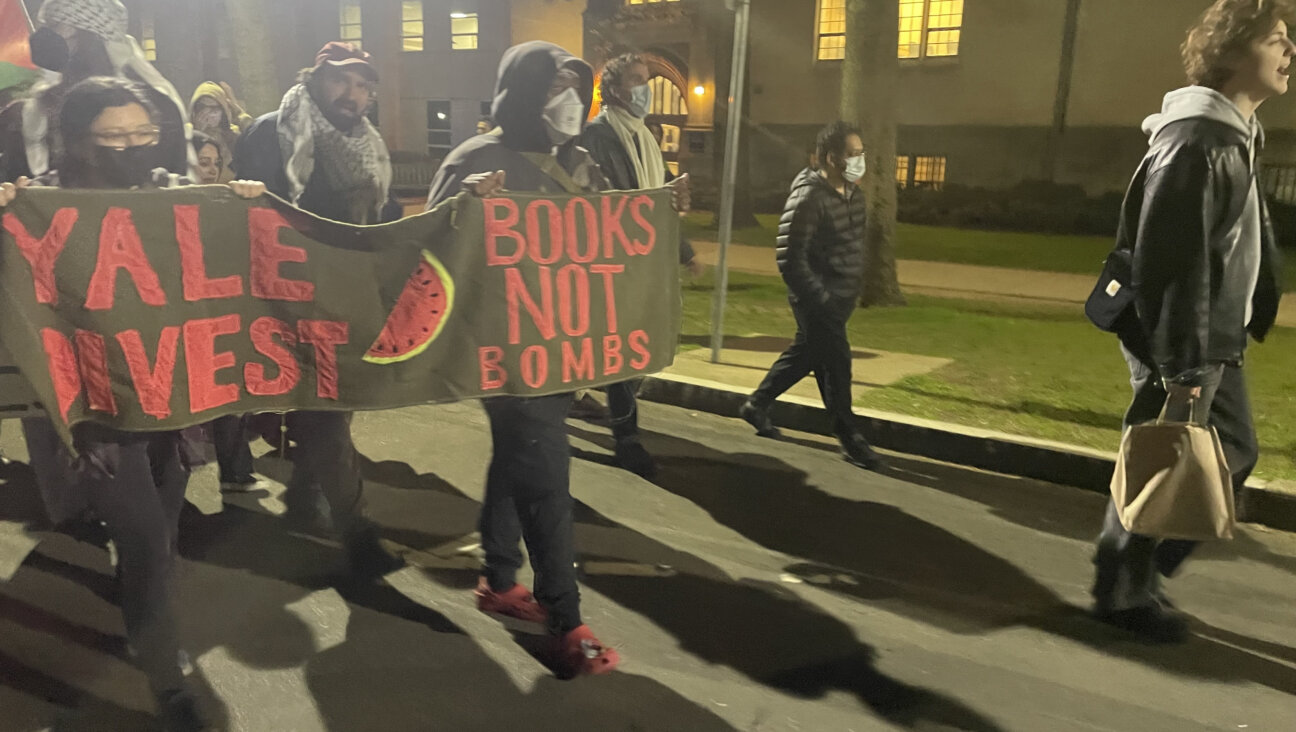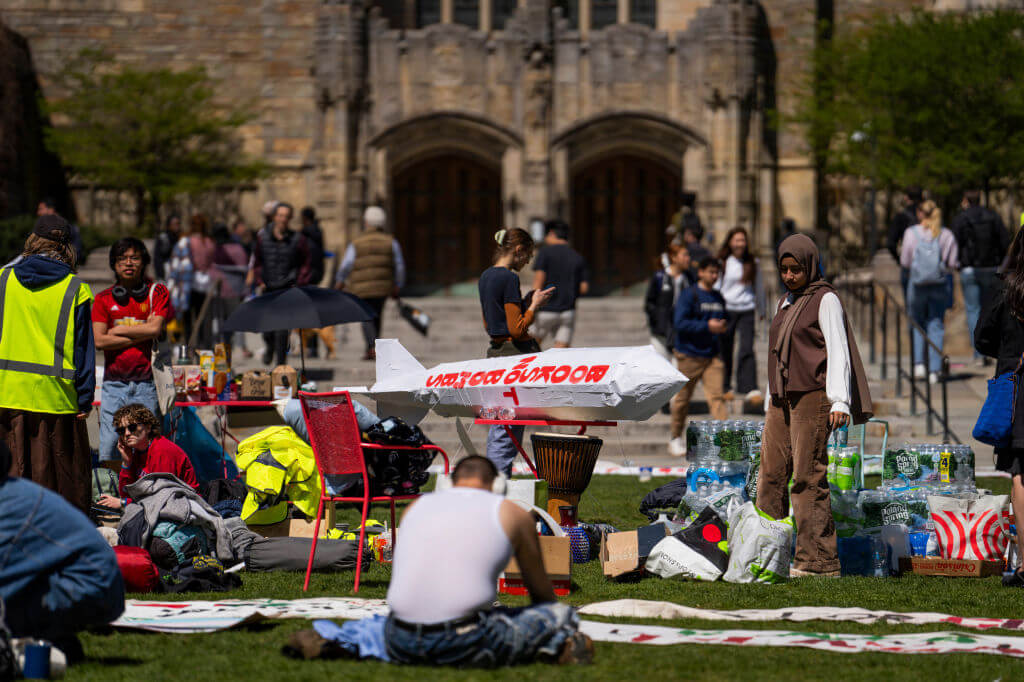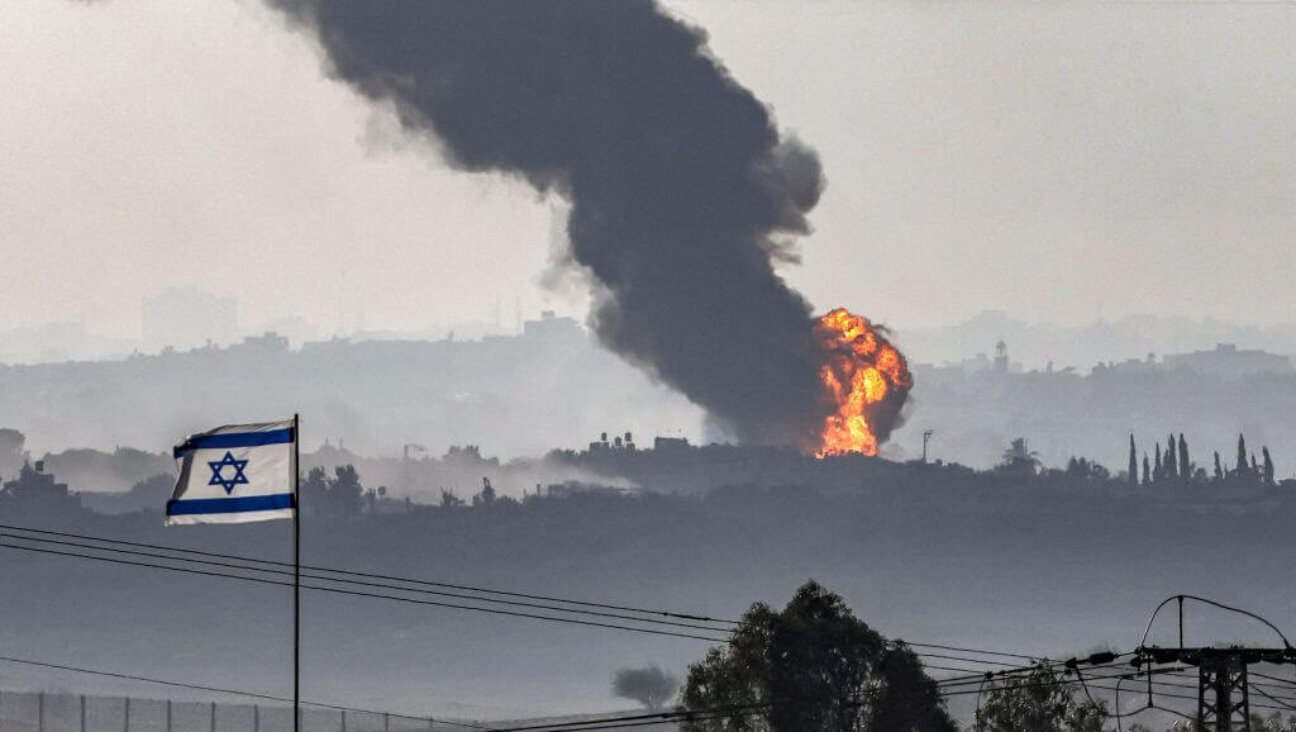When a Molotov cocktail thrown at your synagogue scrambles your Sunday
There’s close to home and then there’s home. This latest act of antisemitism felt like the latter.
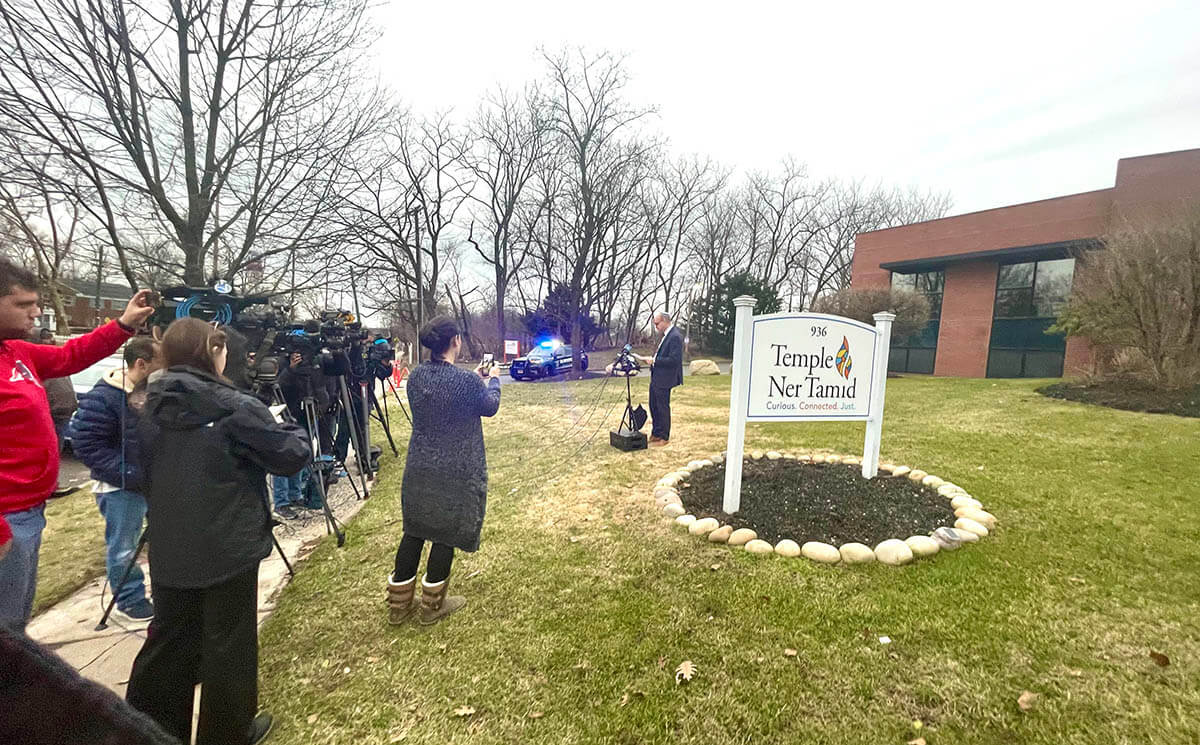
A press conference was held Jan. 29, 2023, outside Temple Ner Tamid In Bloomfield, N.J. Photo by Jodi Rudoren
Our Sundays here in a comfortable New Jersey suburb are often structured around how many times we have to shuttle back and forth to synagogue.
Today, we were meant to bring our 15-year-old daughter there by 9:30 a.m. for her weekly gig babysitting the small children of a woman studying for her adult bat mitzvah, then return to pick her up at 11. The husband was headed over at 2 p.m. for Purim spiel rehearsal (he’s the director). And I had to pick up the Dutch oven I’d dropped off on Friday with veggie chili I made for this weekend’s Shabbaton.
Instead, we got a staccato text message at 9:20 a.m.: “Religious school is closed today due to an act of antisemitic vandalism at 3 a.m. last night. Police are investigating. No one is hurt, No major damage. Check email.”
Surveillance cameras at the synagogue, Temple Ner Tamid in Bloomfield, had caught a man approaching the entrance from the parking lot, the way my kids and I have a thousand times. The footage showed him lighting a bottle on fire and throwing it at the front door. By afternoon, the Bloomfield police had put out the photo, calling him a suspect in an attempted arson.
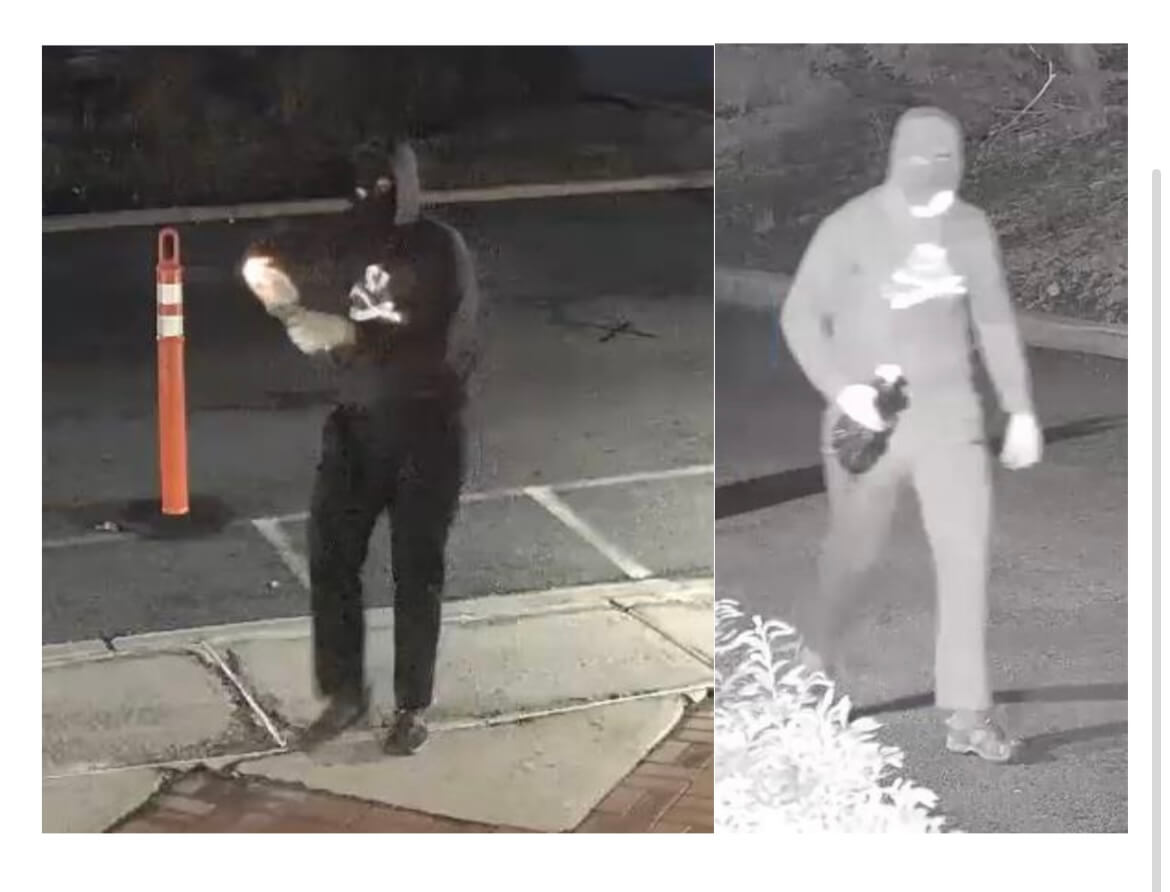
“The fire went out on impact, there is no visible damage to the building, and the door is secure,” said the congregational email blast that landed in our inboxes at 11:11 a.m. “All activities at the synagogue are canceled for today and the police will be maintaining a 24-hour presence for at least the next week.”
For all the reports of spiking antisemitism, a Molotov cocktail being thrown at a synagogue is not very common — it’s happened before, but is not something you see every week or month in the U.S., according to the Anti-Defamation League. The timing is especially troubling: Two days after International Holocaust Remembrance Day and a terror attack in Jerusalem that killed seven people as they left Shabbat services. Two months after an FBI warning of a credible threat against all New Jersey synagogues.
And, Ner Tamid’s Rabbi Marc Katz noted, after a week of two horrific mass shootings targeting Asian-Americans in California and the release of video documenting the brutal and fatal police beating of a Black man in Memphis.
“There is a climate of hate in this country,” Rabbi Katz said at a news conference Sunday afternoon that drew seven television cameras and a dozen reporters, including myself. “We happened to be the congregation targeted but it’s not about us as much as it’s about a general ethos of hate and a general ethos of antisemitism.”
The superintendent of the Montclair schools, which have had their share of antisemitic incidents in the last couple years, put out a statement condemning the attack as “unconscionable and grotesque,” and saying there’d be heightened security and counselors on hand at schools tomorrow.
U.S. Rep. Mikie Sherrill, a Democrat who represents the area, said she was “heartbroken and angry” over the incident. “Our Jewish neighbors are beloved community members,” she said. “Attacks against them are attacks against all of us. We have a responsibility to stand up against antisemitism wherever it rears its head.”
It’s hard to know, frankly, how scared to be. As I wrote after the November FBI warning, our synagogue has made significant security upgrades since right-wing protesters chanted “Jews will not replace us” in Charlottesville in 2017 and a gunman murdered 11 people during Shabbat services at the Tree of Life synagogue in Pittsburgh in 2018.
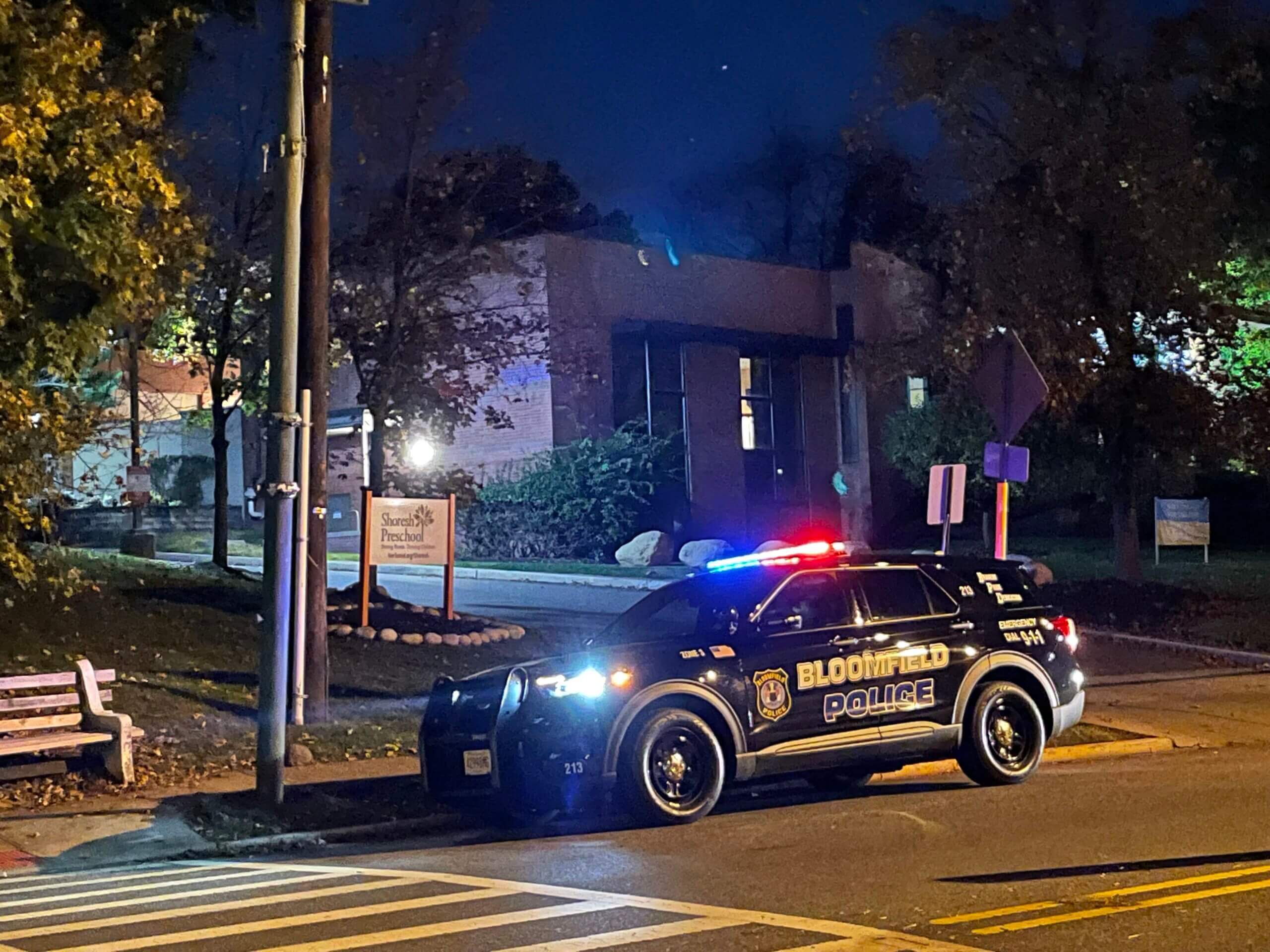
With the help of federal grants, we’ve added boulders to block cars from ramming into the building and film to make the windows shatterproof. We have armed security guards on site when people are inside, panic buttons in the sanctuary and security cameras “everywhere,” Katz said.
“We’ve actually been preparing for this day, unknowingly, for many years already,” he said. “Today, everything worked the way it should.”
The glass didn’t shatter. The cameras caught the guy doing the bad thing.
And yet. It’s hard not to be rattled.
“I’d like to think this is not a warning, honestly; very frightening,” wrote one friend on my mom-text group.
“Agree coulda been worse,” said another. “AND it’s disgusting and pathetic and infuriating — so stupid and depressing.”
“All things considered, it’s as good a version of the situation as it can be,” said a third. “But still, so ugly and awful.”
I overheard my daughter, Shayna, debriefing on the phone with a friend who volunteers Sunday mornings helping the second-grade teacher. They were wondering what the parents of those second graders, who probably already had their shoes and coats on or were event en route to the synagogue when the scary text came, about why religious school was canceled today.
Shayna is supremely rational and resilient. If this makes you more scared, she said as we drove to our favorite brunch place for shakshuka since she didn’t have to babysit, it just means you had an unrealistic view before of how much hate there is in the world. She sees tidbits on TikTok about antisemitic and racist and homophobic hate speech and vandalism practically every day. Like most kids in her generation, she has been doing lockdown drills as long as she’s been going to school. And there was that FBI warning in November.
I asked whether she feels safer at synagogue or at Montclair High School, where she’s a sophomore (and social media chair of the Jewish Student Union). She said there’s no real difference, and that New Jersey’s relatively restrictive gun laws make her feel safer than her peers in states like Virginia or Texas.
But another teenage friend, who works as a song leader on Sunday mornings, was deeply shaken by the incident, probably because she was dropped off at the synagogue before the text message landed. There were four police cars on site, she told me, along with the synagogue’s security team and rabbis. The religious school teachers were all there, some of them sobbing. She started crying, too. People she had never met before were hugging her and offering rides home.
This is how terror works, in Israel and in our comfortable New Jersey suburbs. The point is to make us terrified to do the things we normally do, to be our full Jewish selves, to rehearse the Purim spiel and study and sing and play on the synagogue playground.
“No child should have to face the fear of coming into their place of worship,” Rabbi Katz said at the news conference. “If you no longer come, if you no longer express your faith, the terrorists have won.”
There’s close to home, and then there’s home. Today’s antisemitic incident feels like the latter for me and my kids. We think of Ner Tamid as something of a second home.
It’s where they eat pizza with their closest friends on Wednesday nights before class with the rabbi. Where we sing together in Shabbat services, and where I used to run a little pop-up brunch cafe. Where they had their b’nai mitzvah, of course, and where we’ve screened films and heard lectures and shopped at holiday shows and where, only a few weeks ago, we had the incredible experience of adding a few flourishes to a new Torah scroll.
Where they should be safe. But after Monterey Park and Half Moon Bay and Memphis and Neve Yaakov and Jenin, after Uvalde and Buffalo and Highland Park and Colleyville, is there anywhere safe?
The husband moved spiel rehearsal to the home of one of the show’s stars. She has a piano, and plenty of space. I headed up to White Plains, New York, to pick up my 15-year-old son from his first Jewish youth group Shabbaton.
And then, after Rabbi Katz spoke to reporters, I went inside the synagogue to grab my Dutch oven.
The Forward is free to read, but it isn’t free to produce

I hope you appreciated this article. Before you go, I’d like to ask you to please support the Forward.
Now more than ever, American Jews need independent news they can trust, with reporting driven by truth, not ideology. We serve you, not any ideological agenda.
At a time when other newsrooms are closing or cutting back, the Forward has removed its paywall and invested additional resources to report on the ground from Israel and around the U.S. on the impact of the war, rising antisemitism and polarized discourse.
This is a great time to support independent Jewish journalism you rely on. Make a gift today!
— Rachel Fishman Feddersen, Publisher and CEO
Support our mission to tell the Jewish story fully and fairly.
Most Popular
- 1

Fast Forward Ye debuts ‘Heil Hitler’ music video that includes a sample of a Hitler speech
- 2

Opinion It looks like Israel totally underestimated Trump
- 3

Culture Is Pope Leo Jewish? Ask his distant cousins — like me
- 4

Fast Forward Student suspended for ‘F— the Jews’ video defends himself on antisemitic podcast
In Case You Missed It
-

News In Edan Alexander’s hometown in New Jersey, months of fear and anguish give way to joy and relief
-

Fast Forward What’s next for suspended student who posted ‘F— the Jews’ video? An alt-right media tour
-

Opinion Despite Netanyahu, Edan Alexander is finally free
-

Opinion A judge just released another pro-Palestinian activist. Here’s why that’s good for the Jews
-
Shop the Forward Store
100% of profits support our journalism
Republish This Story
Please read before republishing
We’re happy to make this story available to republish for free, unless it originated with JTA, Haaretz or another publication (as indicated on the article) and as long as you follow our guidelines.
You must comply with the following:
- Credit the Forward
- Retain our pixel
- Preserve our canonical link in Google search
- Add a noindex tag in Google search
See our full guidelines for more information, and this guide for detail about canonical URLs.
To republish, copy the HTML by clicking on the yellow button to the right; it includes our tracking pixel, all paragraph styles and hyperlinks, the author byline and credit to the Forward. It does not include images; to avoid copyright violations, you must add them manually, following our guidelines. Please email us at [email protected], subject line “republish,” with any questions or to let us know what stories you’re picking up.








